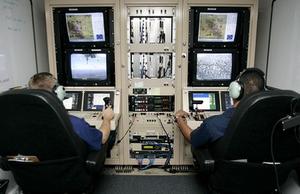SurveillanceCritics say drones make little contribution to border security
A new report says that U.S. Customs and Border Protection (CBP) drones are a wasteful giveaway to defense contractors and a threat to civil liberties. The report cites CBP own figures, the contribution drones make to border security is minimal. According to CBP calculations, drones have played a role in only 0.003 percent in drug seizure and 0.001 percent in illegal border crossing apprehensions.

Border security drone control room // Source: commons.wikimedia.org
A report by the Center for International Policy says that U.S. Customs and Border Protection (CBP) drones are a wasteful giveaway to defense contractors and a threat to civil liberties.
The Huffington Post reports that the study has caught the attention of lawmakers who are considering, whether to increase funding for drones to be used along the border as part of a immigration reform package. CBP currently has seven Predator drones and three Guardian drones in its fleet. Under a $443.1 million contract issued in 2012, the agency could receive fourteen additional drones over the next three years.
Tom Barry, the lead author of the report, said his staff found “an inefficient, costly and absurd approach to border security and homeland security through the purchasing of Predator drones that were designed for military activity.”
The study says that figures show that the contribution drones make to border security is minimal.. According to CBP calculations, drones have played a role in only 0.003 percent in drug seizure and 0.001 percent in illegal border crossing apprehensions.
Barry say, the low numbers have forced CBP to present drone use along the border in a different light. He noted that the agency has now promised to use the fleet to work with the Department of Defense (DoD) and local law enforcement agencies, instead of specifically working in border security.
“I think we should be afraid, in terms of this breaking down of the distinction between domestic law enforcement and national security and foreign affairs,” Barry told the Post. “That line has been criss-crossed many times with DHS.”
Also on Wednesday, the Electronic Frontier Foundation gave recommendations to the Federal Aviation Administration (FAA) in an effort to push for stricter privacy requirements for domestic drones owned privately or used by local governments.
The agency will pick six test sites for domestic drones by the end of the year, and the EEF wants clarification on the surveillance capabilities of the drones.
Jennifer Lynch, a staff attorney for the EFF, told the Post that the FAA should impose privacy protections on government and private drone operators.
“When it comes to drones, the FAA needs to examine privacy issues with the same rigor it applies to flight and mechanical safety,” Lynch said in a statement. “Just as vague safety regulations for drones could result in damage to life or property, vague privacy measures could harm civil liberties.”
